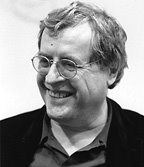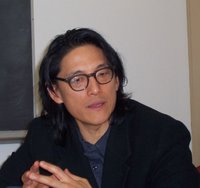3rd Annual PSA Chapbook Reading
Disclaimer: This is one of my long poetry reading posts. If this subject doesn't interest you, best move on.
Thursday night, December 1, I attended the 3rd annual Poetry Society of America chapbook reading. This event is billed as "Inaugural Chapbook judges read with the poets whose manuscripts they selected for publication by the PSA."
I have attended all three years and have found each year rewarding for many reasons. First and foremost, I can hear the work of new poets whose work is being published in book (or "chapbook" form) for the first time. Second, the poets are introduced by the judges, who also read. The judges are well-known, established poets. Third, the chapbooks themselves are beautiful little items and nice mementos (as well as containers of fine poetry). Fourth, it's not an event that is usually attended by a horde of collectors/dealers, so the poets are generally a little more relaxed about signing things. They are also more apt to stick around and be social. Fifth, it serves as fantasy fodder that, some day, I could be up on stage being introduced by a well-known poet. I am generally humble about my poetry, but I inevitably compare myself to the winners and think, in some cases, that I could have done a better job. Thinking and doing, I recognize, are two entirely different realities.
Last year's winners were judged by Henri Cole, Robert Creeley, Mary Oliver, and Claudia Rankine. Oliver didn't make it, and it was the last time I saw Creeley before he died in the Spring. In 2003, the winners were judged by John Ashbery, Carl Phillips, Eavan Boland, and C.D. Wright.
This year, the judges and their selected winners were Carolyn Forché & Idra Novey, Brenda Hillman & Stuart Greenhouse, Li-Young Lee & Cecily Parks and Charles Simic & Misty Harper.
Anyone who knows me well enough knows that I am a diehard Simic fan and an avid collector of his poetry. I see him whenever I get a chance (he lives in New Hampshire, but travels to New York several times a year). The best estimate I can give is that I have 57(!) items signed by Simic, most of which are his own books, but include his appearances in numerous anthologies and journals. I still have several Best American Poetry volumes unsigned by him. That this event, already a favorite of mine, would include Simic was an additional bonus.
The reading began with an introduction by Alice Quinn, poetry editor of The New Yorker, and PSA Executive Director. My friend Jill and I were sitting behind Ms. Quinn, Robert Polito of the New School, and Deborah Landau, also of the New School.
The reading began with poet Brenda Hillman reading two poems, a short one called "Old Ice" and a longer one called "String Theory Sutra." There were distracting problems with the microphone that began with her continued throughout the reading. These technical difficulties have happened before at Tischman Auditorium at the New School. The second longer poem was more memorable.
Hillman then introduced Stuart Greenhouse, whose blog is here. Greenhouse, the only male winner, read well, and I especially liked a poem of his called "Cowrie Apostrophe" which can be read in full here. It reminded me a lot of A.R. Ammons, who is another one of my favorite poets.
Next up was Charles Simic. He read six poems: "My Beloved," "The Prodigal," "Inanimate Object," "Cafe Paradiso," "That Little Something," and "Evening Birds." Simic then talked about how pretty the PSA chapbooks were, compared to his first book publication, What the Grass Says, which he labeled "the ugliest book ever." He then introduced his selection Misty Harper, and she beamed over him. She recalled one of the greatest compliments she had received from an MFA professor who wrote on one of her submissions, "Very Charles Simic." She was quite good and you can certainly tell of Simic's influence.
Simic then talked about how pretty the PSA chapbooks were, compared to his first book publication, What the Grass Says, which he labeled "the ugliest book ever." He then introduced his selection Misty Harper, and she beamed over him. She recalled one of the greatest compliments she had received from an MFA professor who wrote on one of her submissions, "Very Charles Simic." She was quite good and you can certainly tell of Simic's influence.
Next up was Carolyn Forché, who I have heard on several occasions and she never ceases to amaze me. She always reads intensely and passionately about her subject. This night she read poems about her friend and fellow translator/poet Daniel Simko, who passed away last July (2004). She read four pieces: "The Lost Suitcase," "Elegy for an Unknown Poet," "Deathbed," and "The Unknown."
Forché introduced Idra Novey, who entered the contest knowing that she was one of the judges. It was quite apparent that Novey emulates Forché, their work resonated in the same key. Both poets write about Latin America and observe with strong feminine eyes and ears. One of her more memorable pieces was this poem: "The Wailers in Estadio Nacional, Once Pinochet's Provisional Detention Center." Last up was Li-Young Lee, who seemed a little bit disoriented. He praised the winner that he selected, Cecily Parks. He then rambled a bit about the selection process and how he was astonished by Ms. Parks' age. He then read from some unpublished work. It was interesting, but was difficult to follow. He then ended abruptly, really quite disconcertingly so, and ceded the stage to Ms. Parks. This, apparently is not unusual for Mr. Lee, whose readings very recently have been a little "odd," based on other eye-witness accounts. Ms. Parks, who was quite fetching and extremely young, as Mr. Lee reminded everyone, read some fine poems, including "Vessel".
Last up was Li-Young Lee, who seemed a little bit disoriented. He praised the winner that he selected, Cecily Parks. He then rambled a bit about the selection process and how he was astonished by Ms. Parks' age. He then read from some unpublished work. It was interesting, but was difficult to follow. He then ended abruptly, really quite disconcertingly so, and ceded the stage to Ms. Parks. This, apparently is not unusual for Mr. Lee, whose readings very recently have been a little "odd," based on other eye-witness accounts. Ms. Parks, who was quite fetching and extremely young, as Mr. Lee reminded everyone, read some fine poems, including "Vessel".
Please note, I have hyperlinked a lot of the poems mentioned, so as to not overfill the post with poetry.
Then, after the reading ended, I did my signing thing, reaching Lee first and having him sign a copy of his book The City in Which I Love You. He also signed my NEA Writing America anthology and Moyers' The Language of Life anthology. As I scrambled for books, the rest of the judges departed the auditorium for the reception, but I managed to get the chapbook winners to sign their books, with the exception of Stuart Greenhouse. The chapbook writers are always very gracious and thrilled to sign. For example, Idra Novey wrote: "Dear Bill, Thanks so much for giving me my first opportunity to sign a book! The best of luck with your writing -- Idra."
After getting the chapbooks signed by Cecily and Misty, as well, I headed out to the lobby area where the reception was. There I caught Stuart Greenhouse and he signed his chapbook. I then set my sights on Simic, who was sitting signing other books.
I loaded up from my backpack and headed over with an advance reader's copy of Aunt Lettuce, I Want to Look Under Your Skirt, The Horse Has Six Legs: An Anthology of Serbian Poetry, 5 Blind Men, Another Republic, and both hard- and softcover copies of a phenomenal early 1970's book of poems in woodblocks called Land on the Tip of a Hair: Poems in Wood.
Simic was very gracious and thrilled to see so many unusual items in my grasp. Aside from Aunt Lettuce, which was published this year, and the Serbian poetry anthology from 1992, everything else dated from the Seventies or earlier. We chatted about whether What the Grass Says is really that ugly. He insisted, I said it wasn't that bad and I was happy to have it in my collection. I then apologized for the first time I met him, back in 1997, when I heard him read at the New York Public Library and, when face to face, I awkwardly blurted out, "You're my favorite living writer." He laughed and said, "Don't worry, I don't remember, so I guess it didn't offend me."
I thanked him profusely and went back for my items for Forché, who was sitting nearby.
Ms. Forché was signing books obediently for another collector who kept pulling items out of a bottomless satchel. Aside from being a poet, she is also a prolific translator and he had quite a few items. When it was my turn, Forché looked at me holding two measly books, anthologies both, and asked, "You want me to sign those?" I nodded and said "Please," smiling. She said, "I'll make you a deal, leave them with me and kindly get me a glass of white wine." What was I supposed to say? I retrieved the wine and found her still talking to the other collector. She signed my second copy of Best American Poetry 1991, and asked, "Are you a collector?" I said I was and she nodded to the other guy and said "He's a collector too, and he has everything."
Challenged, I announced that I had the full run of Best American Poetry, as evidenced here, all in hardcover, when the smart-aleck pipped "Oh me too." I bit my tongue. I wanted to yell, "Liar! Only Bruce Springsteen and I have full runs, and I have signatures from 145 different poets across the17-year expanse. Can you top that, collector boy?!?" Of course, I said no such thing, and flatteringly told Ms. Forché that I had audio of her reading hermost well-known poem "The Colonel" on my iPod, and that it gives me chills whenever I hear her read it. She seemd to appreciate that and thanked me as I thanked her in turn.
I then tracked down Brenda Hillman and had her sign three separate journals in which her poems appeared (Antaeus, Ploughshares, and The Iowa Review). I then went back to Forché and had her sign the chapbook that she judged. Then, in a final coup de grace, took the remaining three chapbooks to a cluster of Lee, Hillman and Simic, standing together and had them individually sign each chapbook which they had judged, all of which are now double-signed by the poet and the poet's judge. This was a neat feat that I had failed to accomplish in prior years.
All in all, a fabulous event, and the signature total, for those of you playing the petty name count at home, was from all 8 poets, 22 signatures, in 18 items.
Apologies for those of you waiting with baited breath for this long update to be published. I hope it was worth the wait.
As I finish this up at 6:12 AM this morning, the snow is falling outside in a lovely pre-dawn fugue.

No comments:
Post a Comment